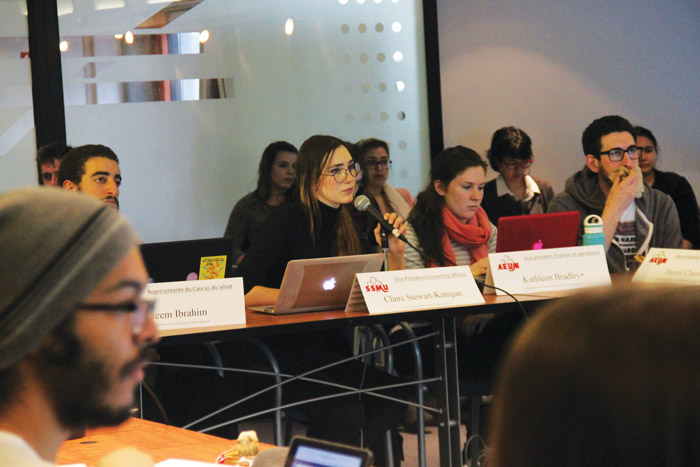Sustainability plebiscite question
Sustainability Research Commissioner Julie Skarha solicited the opinions of Students’ Society of McGill University (SSMU) Legislative Council on the creation of a Vice-President (VP) Sustainability position on the SSMU executive team.
A plebiscite question in the 2015 Winter Referendum on whether to institute a VP Sustainability portfolio or create a full-time Sustainability Coordinator position yielded inconclusive results due to a majority abstention. Skarha went on to outline the fundamental differences between the options.
“A VP Sustainability would be elected by the student body and sit on Council [while] the full-time coordinator […] would be a permanent employee of SSMU focusing on long-term goal setting,” Skarha said.
Another key difference would be the cost to students. According to Skarha, it would cost $10,000 to $20,000 more per year to create a full-time position. SSMU President Courtney Ayukawa cautioned Council members against letting their opinion on the position be influenced by its cost.
“The decision should be made on the basis of what resources students need the most and not based on the cost to SSMU,” Ayukawa said.
VP Finance Kathleen Bradley voiced her reservations regarding the VP Sustainability option, highlighting the level of expertise needed in such a role.
“I think public perception of executives is not very high. Students would be angry at the thought of wasting [their] dollars on executives,” Bradley said. “There are a wide array of skills involved in sustainability that require an intimate knowledge of how […] bonds and equities are traded, which is not something that I think [every candidate] would be comfortable with.”
VP Clubs and Services Stefan Fong echoed these sentiments, adding that the long-term nature of sustainability planning would be better suited to a full-time position.
“Executives tend to change year-to-year […which would] make it difficult to enact change in sustainability,” Fong said.
Arts & Science Senator Chloe Rourke spoke in favour of having a VP Sustainability.
“Having an executive makes it much more public,” Rourke said. “Students are more likely to engage with what a VP has to say because of the representation aspect.”
In the straw poll that followed the discussion, the vast majority of Council members were in favour of instituting a full-time Sustainability Coordinator rather than an executive position.
Motion regarding SSMU’s policy on accessible education
Councillors voted to send a motion regarding SSMU’s policy on accessible education to an unspecified future referendum. The motion calls for SSMU to adopt a broad five-year policy calling for public re-investment in post-secondary education from all levels of government in light of the recent tuition increases and austerity measures imposed by the Quebec government. Several Council members, however, expressed concerns over the wording of the second clause in the motion.
“Be it resolved that the SSMU [oppose] any mechanism or legislation that would permit a non-consensual increase in student fees for any student,” the clause in question reads.
Engineering Representative Anikke Rioux argued that the motion was not a constructive vehicle for alleviating austerity pressures on students.
“It’s hard to get the respect of the government without offering any tangible solutions to the problem,” Rioux said. “There’s a huge debt [in the university] and I don’t think this motion is feasible at the moment.”
Rourke took issue with the long-term nature of the motion, stating that five-year legislation should be forward thinking and not reactive to the current issues facing the student body.
“What if [austerity cuts are] not the case five years from now?” Rourke said. “There might not be a need to mobilize against austerity [at that time,] we don’t know, and that’s not something that should be in this motion.”
An amendment from the floor to strike the clause entirely from the motion passed with a majority vote, but VP Internal J. Daniel Chaim and several other Council members still felt there was a need to bring the amended motion to a referendum.
“Under 100 people stayed at the [General Assembly] to debate this [motion], so I would be nervous to pass [it] at [Council],” Chaim said.
Council ultimately voted to send this motion to a referendum due to a lack of student consensus at the General Assembly.
Negotiations over women-only gym hours
In response to the McGill administration ending negotiations over the implementation of women-only gym hours, Council passed a motion that will look to compromise with the university on certain points in efforts to move forward. Administration announced that negotiations would no longer be ongoing on March 16, citing that McGill University sought to keep its facilities secular and co-educational.
The first clause of the motion aims to re-open negotiations with McGill, and the second clause recognizes the need expressed by the student body for women-only spaces in the fitness centre. Arts Senator Kareem Ibrahim explained the compromise proposed by SSMU to the administration.
“There will be some points in the week where female-identified people will be able to access women-only space—inclusive of trans identities—but no time in the week where male-identified gym patrons will not be able to access gym space,” he said.









